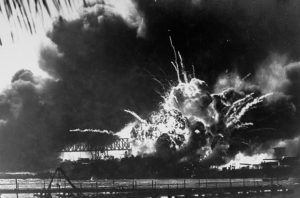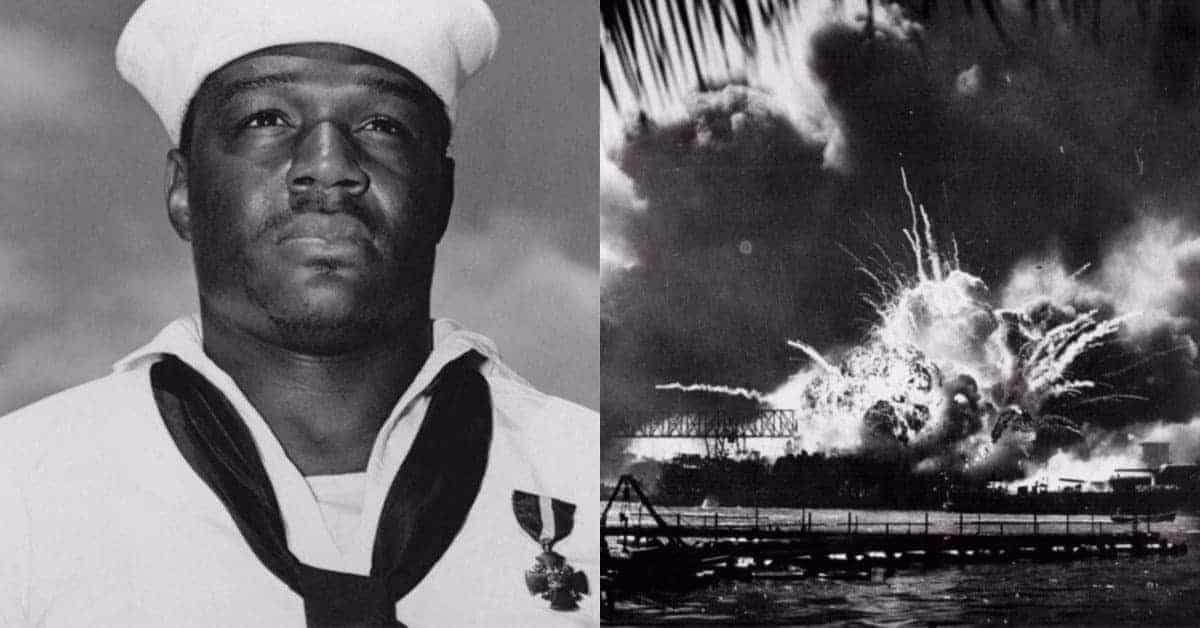Mess Attendant Doris Miller eyeballed the Japanese aircraft barreling down the sights of his antiaircraft gun. He paused for a second, desperately trying to retrace his steps. The day started like any other. Up at 0600, serving chow by 0700, then down to the ship’s laundry until lunch. All hell broke loose somewhere along the way, however, and now Miller, who was just a simple cook from Texas, suddenly found himself fighting for his life.
Oily smoke burned his eyes, while unceasing explosions threatened to rupture his eardrums. Undaunted, he refocused on the plane in his crosshairs and hammered the trigger of the Browning .50 caliber machine gun. The USS West Virginia wasn’t about to go down without a fight and neither was Dorie Miller.
A Day Unlike Any Other
December 7, 1941, began like any other day for Mess Attendant, Third Class, Doris “Dorie” Miller. Unbeknownst to Miller and his shipmates, however, the Imperial Japanese Navy was fast approaching the Hawaiian Islands, hellbent on destroying the U.S. Pacific Fleet. Shortly after dawn, the first wave of an immense strike force unleashed a crippling and devastating surprise attack on thousands of unsuspecting sailors going about their daily business. Hundreds of Japanese bombs and torpedoes slammed into Pearl Harbor, sinking four warships, dealing serious damage to four others, and taking over 2,000 American lives.
Miller, who was separating uniforms and cleaning linens below deck, was shocked and confused by the initial attack. When general quarters sounded, however, months of training instantly took over. He donned a helmet and ran to his assigned station only to discover the area in shambles. One of the seven Japanese Type 91 aerial torpedoes had struck its intended target, virtually vaporizing the ship’s antiaircraft magazine. Wanting to help his shipmates above deck, Miller raced up a nearby ladder well and proceeded to “Times Square,” an aptly named junction at the heart of the West Virginia where hundreds of sailors converged daily.

The ship’s communications officer, Lieutenant Commander Doir Johnson, spotted Miller and quickly flagged him down for assistance. The pair of men raced to the bridge where their captain, Mervyn Bennion, lay gravely wounded. Miller and Johnson moved Bennion near the conning tower, where he continued to issue orders despite a gruesome abdominal injury. Another officer then ordered Miller to assist a nearby ensign with the loading of an unmanned antiaircraft machine gun. Unfamiliar with the weapon, Miller nevertheless loaded the gun and then took it upon himself to deliver a barrage of withering antiaircraft fire at the circling Japanese planes above, expending all his ammunition in the process.
With the Browning machine gun run dry, Miller turned his attention back to his wounded skipper. Along with two lieutenants, Miller, moved Bennion up to the ship’s navigation bridge, where the semiconscious captain succumbed to his wounds. Two armor-piercing bombs and an additional pair of Japanese torpedoes suddenly exploded underfoot, threatening to capsize the ship. Miller assisted with the evacuation and was later awarded the Navy Cross for incredible heroism in the face of grave personal danger. The ever-humble sailor later recounted that “I guess I fired her for about fifteen minutes. I think I got one of those Jap planes. They were diving pretty close to us.”

